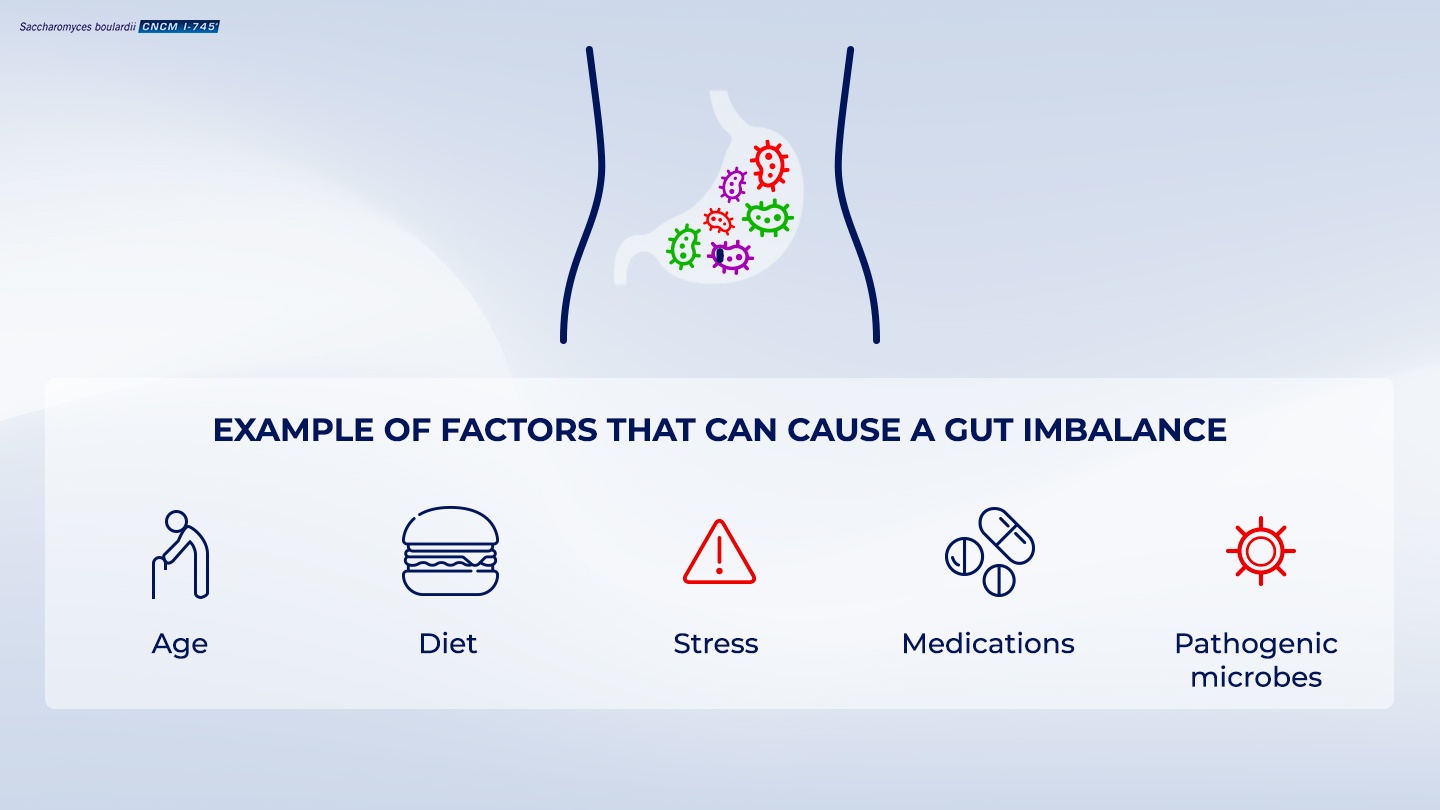An imbalance in microbiota highlights how important microbiota is for a healthy gut
- Video
- 4 min
- Files
What does gut imbalance mean?
Trillions of microbes can be found in the gut, predominantly in the colon (called gut microbiota).1
An unfavourable imbalance of microbiota composition and diversity is referred to as dysbiosis.2 During an imbalance of the gut microbiota, pathogenic species such as Clostridium difficile3 or other species increase in number (such as Enterobacteriaceae, Bifidobacteriaceae, and Clostridiaceae), while there is a reduction in the number and diversity of some microbiota population (Lachnospiraceae, Ruminococcaceae, Bacteroidaceae, and Prevotellaceae) by at least one order of magnitude.3
Dysbiosis can occur due to improper diet, exposure to pathogenic microbes (e.g. bacteria, viruses or parasites), stress, environmental factors, old age or drugs such as antibiotics.3 For example, an animal-based diet can quickly alter the composition of the intestinal microbiota and decrease bacteria that metabolise diet-introduced plant sugars.4 Or, following antibiotic treatment, some pathogenic species can increase rapidly by exploiting microbiota-induced sugar production to promote their growth.5 Furthermore, studies into the microbiota diversity and composition of elderly people have shown differences in composition between healthy and frail individuals.6

(Internal code : 20.60)
What are the consequences of a gut imbalance?
During dysbiosis, processes that are influenced by the normal gut microbiota can be altered.3 This disruption can often result in diarrhea due to:
- reduced fermentation and metabolism of nutrients which increase the amount of water moving into the gut3 ;
- increased inflammation that damages the tight junctions between cells and allows water and electrolytes to leak out3 ;
- damage to the protective mucous layer, allowing harmful bacteria to attach to the gut cells3 ;
- release of toxins by harmful bacteria such as Clostridium difficile that causes increased water secretion and damage to cells resulting in diarrhea.7
Finally, the diarrhea associated with dysbiosis can result in loss of the normal microbiota, further reducing diversity.3
Therefore restoring the balance of microbiota is important to reduce the effects of gut imbalance, but also to reduce longer-term symptoms such as persistent inflammation.3 Taking a probiotic such as the single-strain yeast probiotic Saccharomyces boulardii CNCM I-745 can restore the balance of microbiota as well as reduce the symptoms of diarrhea.3
Saccharomyces boulardii CNCM I-745 restores the balance of gut microbiota and prevents diarrhea associated with a microbiota imbalance
S. boulardii CNCM I-745 has been demonstrated to prevent diarrhea of different origins. The yeast has been shown to have a positive effect in many different situations that cause a gut imbalance thanks to its unique properties : 3
- naturally resistant to antibiotics ;
- does not permanently stay in the gut, so does not upset the balance of microbiota ;
- prevents harmful bacteria from accessing the lining of the gut ;
- destroys harmful toxins ;
- secretes substances that have an anti-inflammatory effect ;
- stimulates the growth of gut cells.
Clinical studies have shown that S. boulardii CNCM I-745 treatment increases the levels of beneficial bacteria.3 S. boulardii CNCM I-745 treatment has also been demonstrated to reduce the frequency and duration of diarrhea during antibiotic treatment1, and the risk of harmful C. difficile infection following antibiotic treatment.1
The action of S. boulardii CNCM I-745 creates a favourable environment for beneficial gut bacteria, to restore the balance following dysbiosis.3
Internal code : 20.38
References
- 01 . Guarner et al. Probiotics and prebiotics. World Gastroenterology Organisation Global Guidelines. February 2017. https://www.worldgastroenterology.org/guidelines/global-guidelines/probiotics-and-prebiotics/probiotics-and-prebiotics-english. Last accessed 14th November 2019.
- 02 . Marteau, P and Dore J (Ed.), Gut Microbiota: A full-fledged organ. 2017. Paris: John Libbey Eurotext.
- 03 . More MI, and Swidsinski, A. Saccharomyces boulardii CNCM I-745 supports regeneration of the intestinal microbiota after diarrheic dysbiosis–a review. Clinical and experimental gastroenterology. 2015; 8: 237.
- 04 . David LA et al. Diet rapidly and reproducibly alters the human gut microbiome. Nature. 2014; 505(7484): 559-563.
- 05 . Ng KM, et al. Microbiota-liberated host sugars facilitate post-antibiotic expansion of enteric pathogens. Nature. 2013; 502(7469): 96-99.
- 06 . Claesson MJ, et al. Gut microbiota composition correlates with diet and health in the elderly. Nature. 2012; 488(7410): 178-184.
- 07 . Castagliuolo I, LaMont JT, Nikulasson ST, Pothoulakis C. Saccharomyces boulardii protease inhibits Clostridium difficile toxin A effects in the rat ileum. Infect Immun. 1996; 64:5225–5232. doi: 10.1016/S0928-8244(96)00073-9.
